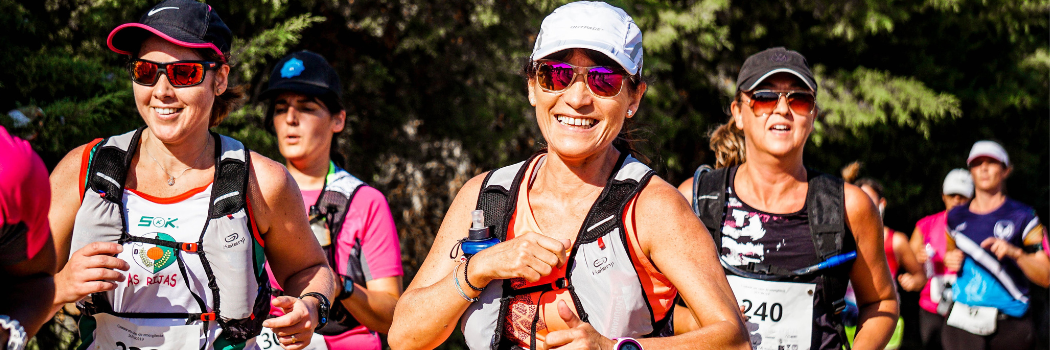London marathon: what to eat before, during and after the race

Thousands of people take part in the London Marathon every year, with many more attempting to run the 26.2 mile distance in marathons across the world. Dr Lindsay Macnaughton from our Department of Sport and Exercise Sciences talks us through some effective fuelling strategies.
After all the hours that have gone into training for a marathon, it would be a shame to fall at the last hurdle because you haven’t given your body the nutrients it needs.
Your body uses carbohydrates to fuel high-intensity exercise, including marathons. While the body stores some carbohydrate (in the form of glycogen) in the muscles and liver, unfortunately, it can’t store large amounts. So when we don’t have enough carbohydrate available to use as fuel during exercise, energy levels drop and we start to fatigue. During a marathon, this fatigue might take the form of heavy legs, or “hitting the wall”. It can also lead to low blood sugar, leaving you feeling light-headed and weak.
Hydration levels also will affect how you feel during the race and how well your body can cope with the race demands. Dehydration puts additional strain on your body, which makes racing feel harder, affects temperature regulation and contributes to fatigue.
Since no one wants to feel this way during a race they’ve spent months training for, it’s important to make sure you’re fuelling yourself properly – not just on race day, but in the days leading up to it, too.
Pre-race prep
Before the race, you need to have enough glycogen stored in your body.
One way to top up glycogen stores before the race is through “carb loading”. This doesn’t mean eating as many carbs as you can the night before a race. Rather, it means increasing the amount of carbs you eat about two days before the race.
A carbohydrate intake of 7-12g per kg of body weight in each 24-hour period is recommended. So each meal, try to eat slightly more carbohydrates than usual and include between two and three high-carb snacks between meals.
Pasta, rice, bagels, bread, potatoes and cereal are all great carbs to include in your meals. For snacks, try pancakes, bananas, rice cakes with jam or toast with honey. If you’re susceptible to an upset stomach, lower-fibre options, (such as white bread or pasta) may be helpful.
Staying hydrated in the days before the race is also important. An easy way to judge if you’re hydrated is to check the colour of your urine – it should be a pale straw colour. Check the weather as well. If it’s hot leading up to the race, you may need to drink more than you normally would to be hydrated.
Race day
On race day, make sure to arrive with a nutrition and hydration plan in place. On the days before the race, check what stops there are, and what each station will have. This will help you know what you’ll need to carry during the race. Ideally, use this plan in training to get your gut used to the amount and the types of carbohydrates you will consume during the race.
Race day starts with breakfast. This meal tops up your liver glycogen stores, which deplete overnight, and helps to control blood sugar levels. Aim to eat breakfast two to four hours before the race, and keep it high in carbohydrates and low in fat, fibre and protein to aid gut comfort. Toast with jam, cereal or a bagel with honey and a chopped banana are good options.
Drink 5-7ml per kilogram of body mass of fluid three to four hours before the race starts. After you warm up have some more carbs to top up your fuel stores.
Since you’ll be running for more than two hours, you’ll still need to top up your glycogen stores during the marathon. Aim to consume 30-60g of carbohydrate per hour. While the body can use up to 90g of carbohydrate per hour during a marathon, you should only eat this amount if you’ve done it during training to avoid stomach problems.
Gels, chews, energy bars, bananas, jam sandwiches and sports drinks are all great carb sources to eat during the race. Make sure to only consume products you’ve had before to reduce potential gut discomfort. Consume fluid regularly throughout the race in small amounts. Take care not to over-consume fluids, as this can cause exercise-induced hyponatremia, a potentially life-threatening condition caused by low sodium levels in the blood.
Post-race recovery
Once you’ve celebrated crossing the finish line, it’s time for the recovery process to begin.
Start by replenishing both fluid and carbs. Often it can be hard to eat straight after a marathon, so liquid options might be better, such as a sports drink, smoothie, milkshake, or even yoghurt pouches. Milk is also an effective post-exercise re-hydration drink, which has the added benefit of containing protein. This helps with muscle growth and repair.
Your celebratory, post-race meal should be high in carbs and protein. In the four hours post-race aim to have 1-1.2g of carbs per kilogram of body weight each hour. Aim for 30-40g of protein to help your muscles recover. Though you might want to have some celebratory drinks, drinks with more than 4% alcohol content can negatively affect recovery.
To make sure all that hard training doesn’t go to waste, make sure to plan out your diet carefully in the days leading up to a marathon so you’re properly fuelled. And be sure to stick to familiar foods before and during race day to try to avoid any stomach problems that may jeopardise all your hard work.
Find out more
- This article is republished from The Conversation under a Creative Commons license. Read the original article
- Take a look at Lindsey's research
- Learn more about the work of our Department of Sport and Exercise Sciences


/prod01/prodbucket01/media/durham-university/departments-/sport-and-exercise-sciences/sport/86041-1.jpg)